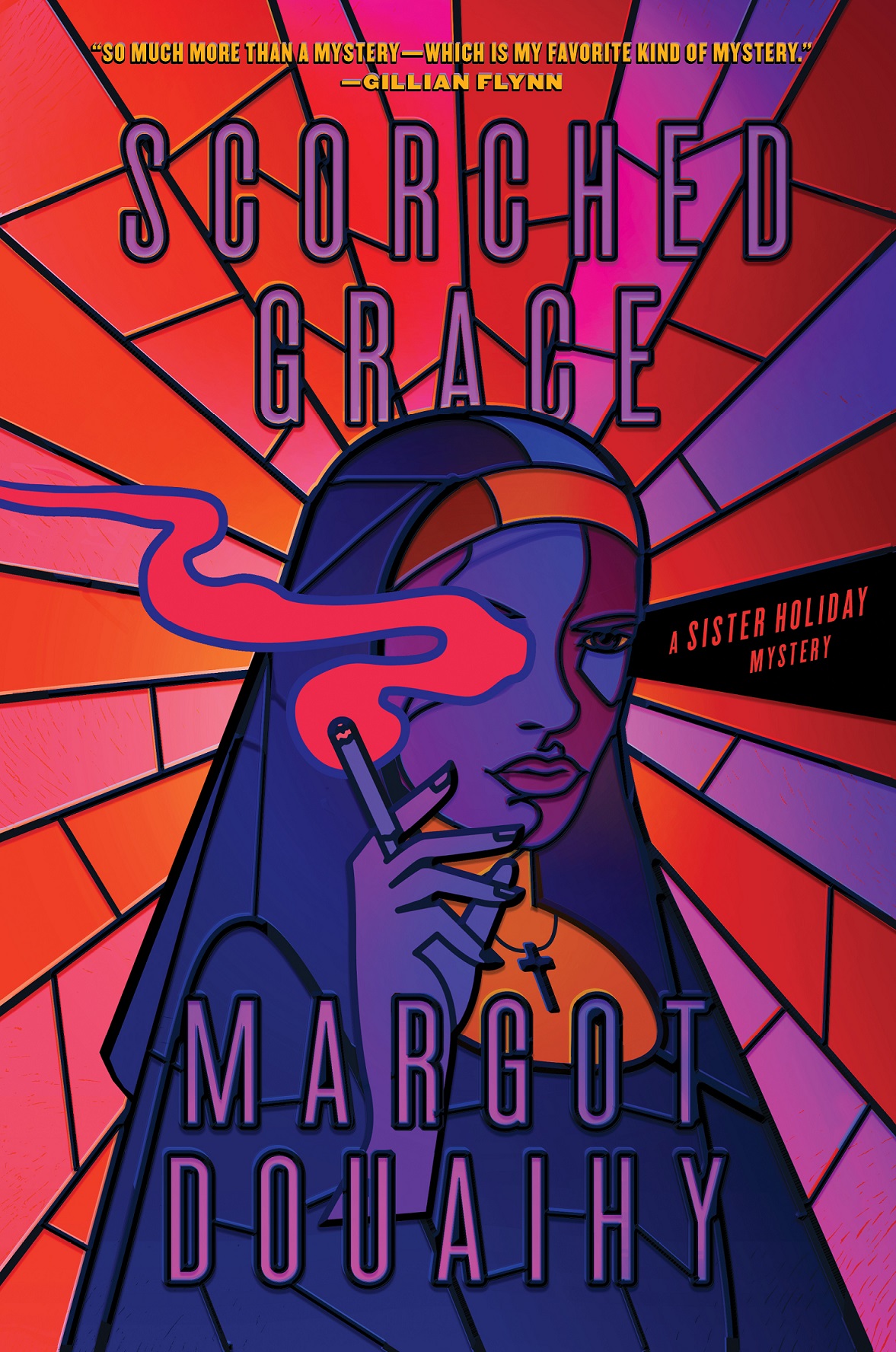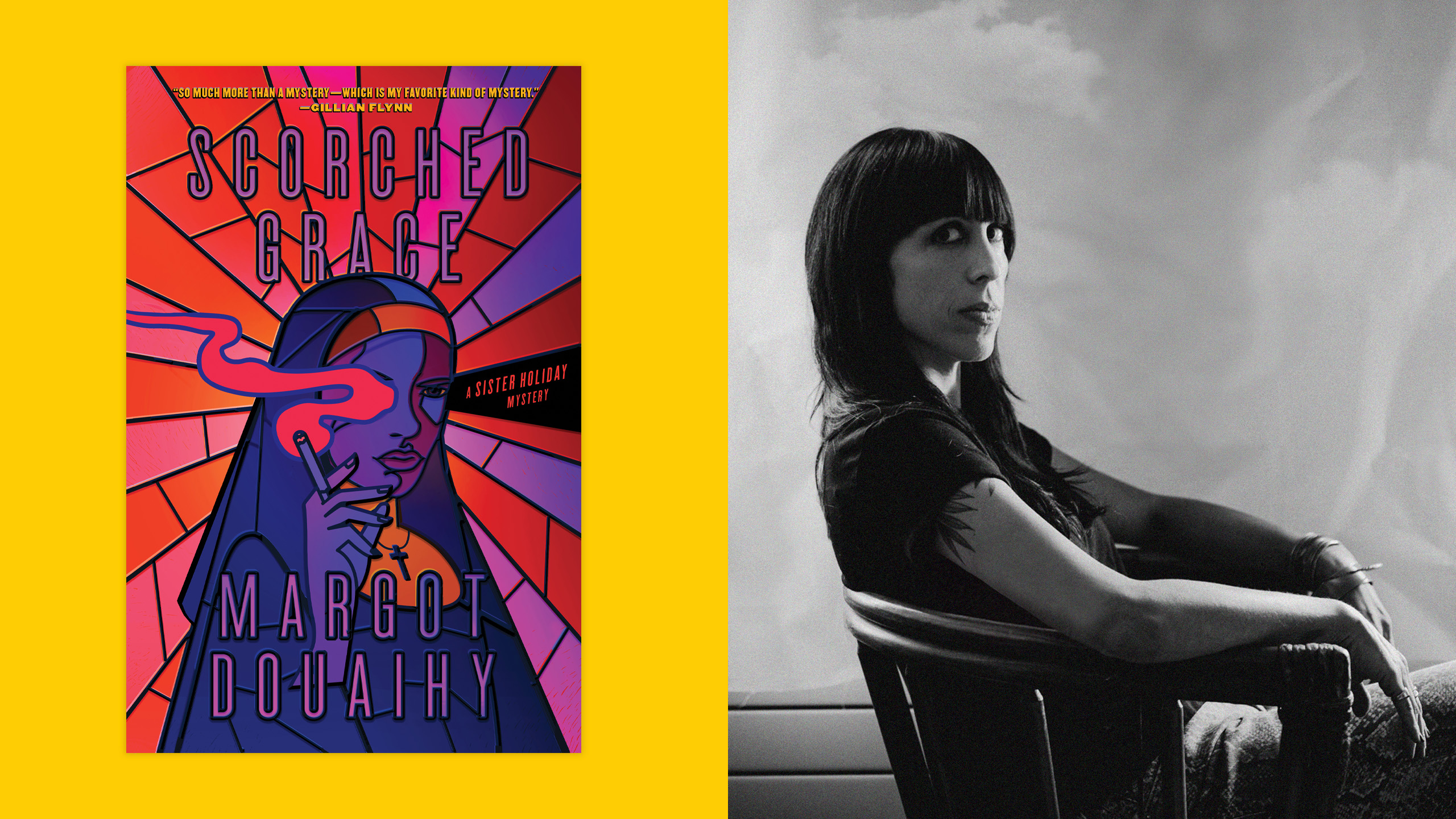There is a long and smutty history of nuns in queer media, particularly in film—nunsploitation is, after all, its own film subgenre. Nunsploitation, which peaked in the 1970s in Europe, doesn’t always feature lesbian desire and misbehaviour, but nun-on-nun activity is nonetheless a common trope—all-women populations cloistered in isolated medieval convents and sworn to chastity, are, at least in our collective horny imagination, hotbeds for perversity and lesbianism.
Pedro Almodóvar’s Dark Habits (1983) is a favourite of mine, featuring a corrupt Mother Superior who shoots heroin and lusts after members of her crumbling order, after giving them names like Sister Manure and Sister Damned. Search “lesbian nuns” on IMDB, and you’ll get a long list, including titles like The Nun and the Devil (1973), Behind Convent Walls (1978), Killer Nun (1979) and School of the Holy Beast, a Japanese contribution from 1974 described as “Dario Argento meets the Marquis de Sade.” Recently, Showgirls director Paul Verhoeven threw his hat in the ring with Benedetta, which premiered at Cannes in 2021 and was derided as “nunsense” and “Showgirls in a convent” by AP Entertainment. To which I say, sign me up.

Margot Douaihy’s Scorched Grace, the debut novel from Gillian Flynn Books, the eponymous new imprint from the Gone Girl author, is a snappy literary contribution to the lesbian nun genre, though it’s less smut and more hard-boiled crime thriller. Many of the nunsploitation themes are present: the interpersonal dramas of the cloister, the tension between faith and corruption, the teasing interplay of chastity and desire and the mounting sense of evil and catastrophe. But instead of being concocted by a male auteur, the story is written by a queer female author and narrated by the wisecracking, hotheaded 33-year-old queer-punk-rocker-turned-devout-Catholic Sister Holiday.
Douaihy is an Arab-American writer based in Northampton, Massachusetts, who has previously published five collections of poetry, and whose focus on queer crime writing expands into the realm of literary criticism, in addition to fiction and poetry. She is currently developing “a collection of critical essays examining queer erasure and performativity within the hard-boiled crime fiction genre.” This dedication to upending some of the tired gendered tropes of crime fiction is clear in her debut novel.
Sister Holiday is a fully formed, tortured sleuth, both frustratingly hard-headed and wrenchingly sympathetic, especially as we begin to learn her backstory. As penance for a terrible mistake in her past, which Douaihy expertly reveals bit by devastating bit over the course of the novel, Sister Holiday is “serving the impossible truth of queer piety” in a convent that forbids mirrors, computers, cameras, phones, money and, of course, sex. Having fled her old life as a messy, alcoholic New York lesbian and lead guitarist of the queer punk band Original Sin, she is now a music teacher at Saint Sebastian’s, a Catholic school in lush, sweaty New Orleans, and a member of the Sisters of the Sublime Blood, who are “a progressive order, but Catholic sisters all the same.”
She stands out among the older members of the order, even with her tattoos covered: “‘I thought you were the school’s death-metal lunch-lady,’” one character remarks. Sister Holiday’s contradictions make her a compelling narrator, especially because we can’t tell when she is lying to herself. She seeks refuge in the strict rules of the Catholic order she has recently joined, but refuses to shed her own modes of faith and religion. She scrubs the stained-glass windows and dutifully teaches guitar arpeggios to her distractible and sometimes troubled students; she also refers to God as “they,” smokes her students’ contraband cigarettes, fantasizes about past trysts with her ex, Nina, and hides full-body tattoos under black gloves and scarves. Her past proclivity for fist fighting and quick temper sometimes result in inappropriate teacher behaviour.
“Her fiery temper and belief in justice and redemption won’t allow her to stand by when a presumed arsonist threatens the peace.”
When disaster strikes Saint Sebastian’s, in the form of arson and murder, Sister Holiday’s inability to stand by draws even more attention to her, and might be a danger to her life. Scorched Grace has much in common with the neo-noir detective shows that have dominated my own binge-watching for several years (Mare of Easttown, Happy Valley, Broadchurch, True Detective). Sister Holiday’s amateur sleuth is akin to those other detectives, who are determined to break open the case even at the risk of destroying their own already precarious personal lives. Tortured by her own dark past, she treasures the calmness of Saint Sebastian’s, yet at the same time, her fiery temper and belief in justice and redemption won’t allow her to stand by when a presumed arsonist threatens the peace. She attempts to compartmentalize the traumas of her own life as she becomes obsessed with solving the rapidly developing mystery. But it begins to close in on her, threatening to destroy any semblance of calm she has found in New Orleans.
The criminal action begins right under Sister Holiday’s nose, which means that she is dragged into sleuthing almost against her will—although of course there are many points afterward when she could butt out, but stubbornly keeps digging. During a forbidden smoke break in an alley near the school, she witnesses one of the building’s wings burst into flames, and the burning body of one of the school’s janitors go flying out a window. As the first responder, she rescues one of the students from inside the blazing school, and, smoke inhalation be damned, is immediately determined to find the culprit from among the motley population of Saint Sebastian’s—nuns, students, teachers and maintenance staff are all on the list.
More sudden fires and deaths ensue, along with clues that Sister Holiday is being framed. Of course, it’s not so easy to convince the local cops and the fire investigator, who are irritated by her stubbornness and her distinctly un-nunlike appearance. Meanwhile, in addition to nightmarish flashbacks from traumatic events in New York, she has to contend with her ex, Nina, who is in town wanting to rekindle the years-long passionate affair they’d been having as bandmates—throughout Nina’s marriage to a man. Of course, because sex—especially lesbian sex—is now off the table for our newly pious nun-sleuth, the temptation to give into her hot ex-lover’s advances is, shall we say, a fire that’s tough to put out. It’s a lot to juggle, but Douaihy writes Sister Holiday with warmth and zest, even when she’s losing control of her temper in the present, or recalling regrettable actions in her past.
“When she recalls the electrifying sexual chemistry she had with Nina, she brings an air of holiness, of religious ecstasy, to their desire.”
Queerness and religion are not presented as being at odds here. Even the patron saint of the school, Saint Sebastian, is a gay icon, thanks to Derek Jarman. There is never any hint that Sister Holiday is confused about her sexuality or that she is trying to shed her queerness or political awareness. When she recalls the electrifying sexual chemistry she had with Nina, she brings an air of holiness, of religious ecstasy, to their desire: “We fit together like two clasped hands, slick with sweat.” At Saint Sebastian’s, which is being overseen by an increasingly overbearing diocese, she sees herself as “a dyke David to the patriarchy of Goliath.”
She was drawn to the Sisters of the Sublime Blood because of its progressive history of fighting for reproductive and racial justice. In fact, she combines her faith with her gay powers of perception in order to fuel her zealous sleuthing. She refers to herself as “God’s mercenary” and “a holy instrument,” and takes inspiration from the many female mystics who were nuns, including Beatrice of Nazareth, Consolata Betrone and Sister Helen Prejean. Mystic powers and insight are key to her crime-solving method: “As a queer woman and a Sister of the Sublime Blood, I looked beyond the immediately obvious.” Having grown up as a queer kid with a younger queer sibling to protect, she harnesses the powers of queer perception and dissimulation in order to sniff out the truth: “My queer paranoia had trained me to search in unexpected places.” Nuns, like sleuths, are generally good at fading into the background, going unnoticed. Unfortunately, Sister H’s own queerness and bold attitude do not allow her to be as unremarkable as she might like, which is tough for her, but fun for us.
Just as Sister Holiday is a compellingly contradictory protagonist, New Orleans is a fittingly dual-natured setting for this hard-boiled, habit-clad whodunnit. “The air was thick and gritty, like it wanted to bare-knuckle fight” is the first noirish description of the city. But this line is soon followed by breathtaking scenes of overflowing flowered vines and colourful houses. Douaihy never loses sight of the city itself—its unrelenting wet heat, its exuberant vegetation and lush bouquet of flowers, its booze and celebration and decay, not to mention its own difficult history. The brutal government response (or lack of response) to Hurricane Katrina is often referred to, alongside the tantalizing colours, energy and music of New Orleans’ neighbourhoods. Sister Holiday calls it “the city where magic and trauma coexist.” It’s a dazzling backdrop against which the kaleidoscopic mystery of the continued fires and murders shimmers.
Douaihy manages a confident, well-paced thriller—presenting a wide assortment of possible suspects, and never giving away too much at once. Despite Sister Holiday’s gay detective skills, she and we are kept guessing about the identity of the killer until the final pages. The only element that feels undercooked is the introduction of a new love interest too near the end, which feels unearned and a bit hollow. Here and there, some corny turns of phrase pop up: after the death of a colleague, Sister Holiday looks up at the stained-glass windows and thinks, with great earnestness, “Panes, pain.” After another murder, she laments: “Our Order, out of order.” I’m tempted to make a joke about nuns and pun-ishment. But cheesy observations here and there can be forgiven, as they tend to mesh well enough with the hard-boiled noir tone. “We were both chasing the big bad, me and Riveaux,” Sister Holiday remarks of herself and the fire investigator on the case, “One case to solve, two scores to settle.” There’s a procedural familiarity to this kind of declaration—strangely comforting even though we know that bad things are going to happen.
Overall, Scorched Grace is a highly readable, satisfying mystery, and a welcome introduction to the queer detective nun whom we didn’t know we needed. As the first publication from Gillian Flynn Books, it hints that we can expect more similarly bold titles to come, titles that allow queer and female characters to be complicated, corruptible, untrustworthy, even evil. This isn’t a surprise, given Flynn’s own work, and her assertion that feminist crime fiction should include female villains, instead of making all female characters gentle, brave and nurturing. I’m assuming there will be more crimes for Sister Holiday to solve in the future, given that this is billed as “A Sister Holiday Mystery,” and that Stone Village Productions (Station Eleven) has already acquired the rights for a television series.


 Why you can trust Xtra
Why you can trust Xtra


